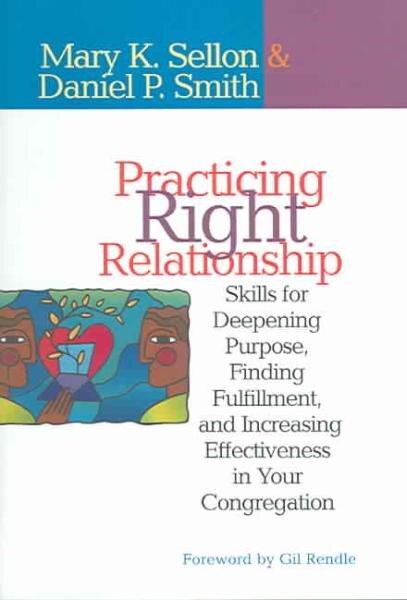Mary K. Sellon and Daniel P. Smith, Practicing Right Relationship: Skills for Deepening Purpose, Finding Fulfillment, and Increasing Effectiveness in Your Congregation. Alban Institute, 2004.
Referenced in:
- Church Conflict – Communication, Healthy Behavior, Forgiveness
- Leadership Development Through Communication Competence
LifeandLeadership.com Summary
This book is designed primarily to help church leaders develop relational competence, and secondarily to help one’s congregation “build and maintain loving relationships that provide the medium for God’s transformative work.” (xiv) This reflects the authors’ research and experience that revealed the importance of relationships to pastoral success. It is an excellent tool for looking at relationships as an expression of one’s spiritual formation and practice. The authors strike a good balance between reflection and practical exercises. They utilize some of the more recent theories such as Daniel Goleman’s emotional intelligence, John Gottman’s discoveries on successful relationships, etc. It can be used individually or in groups. Each chapter builds on the other, so it needs to be read and exercised in its entirety.
Most of these chapters build on Daniel Goleman’s four basic skill areas for developing good relationships: self-awareness, self-management, social awareness, and relational management.
Chapter 1 addresses self-awareness, defined as “being present in the moment to what we are feeling and what’s important to us.” (14) It involves four foundations: know where you are, know how you feel, know what you value, and know what you dream.
Chapter 2 focuses on self-management, defined as “making choices regarding our perspectives, feelings, and actions that support our values, our dreams, and our understanding of God’s dream for the world.” (30)
Chapter 3 looks at social awareness, learning how to love our neighbors. We do this by setting aside assumptions, becoming curious, and listening and learning. The authors stress developing awareness of the people around us, especially in getting to know someone in deeper than normal ways
Chapter 4 puts together the preceding skills and offers six essential questions and choices to helps us love another person:
- What do I want my relationship with this person to be like?
- What attitudes and values do I want to honor as I am with this person?
- What must I let go of in order to turn towards this person?
- What is the goodness in this person that I will see and trust?
- How will I acknowledge to the person the holy goodness that I see in her or him?
- What will I dare to ask of this person?
Chapter 5 takes us into forming and living right relationships as “open channels through which God can work.” (85) They offer three structural components of right relationship: finding alignment around our task, developing covenant agreements about how we will live and work together, and opening ourselves to God’s spirit. (86)
Chapter 6 responds to challenging, real-life situations as people apply the principles and skills found in the book.
From the Publisher
Why is it that some pastors flourish wherever they go, while others with superior theological and practical training continually fail? Why do some insignificant events end up touching people in significant ways? Why do people leave churches with vibrant and exciting programs while others remain loyal to churches that seem to have very little to offer? What makes the difference?
In a book that is both profound and practical, Mary Sellon and Daniel Smith make the case that the health of churches and synagogues depends on congregations learning how to live out love in “right relationships.”
The authors found that the effectiveness of a congregation, as well as the participants’ sense of fulfillment and commitment, varied according to the quality of their relationships with each other.
“Pastors who possessed strong relational skills and worked at establishing healthy relationships thrived almost anywhere they went,” write Sellon and Smith. “Pastors less adept at relationships continually struggled even though they engaged in the same best practices as their colleagues.”
The quality of relationships seemed to be the key. Leadership is not a matter of using certain skills and implementing particular practices, nor is it about being right. Leadership is a relationship.
Sellon and Smith bring together the wisdom they gained in their work with dozens of pastors and congregations with the findings of prominent researchers on emotional intelligence and relationship dynamics to show the practices that are central to building relational leadership.
About the Authors
Mary K. Sellon is a Methodist minister and former pastor who has worked with leader development. She is also a certified professional co-active coach who assists clergy and congregational teams find effectiveness and fulfillment in their work.
Daniel P. Smith is a Methodist minister who has served as a pastor, district superintendent, and judicatory executive. He is also a certified professional co-active coach who works with clergy and congregational teams.
***For additional information on this resource, including reviews, click the bookstore links. Check the reference at page top or the links below for resource guides on related topics.***
Related Areas
See Resources on Over 100 Ministry Topics:


